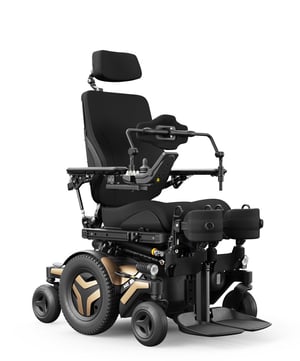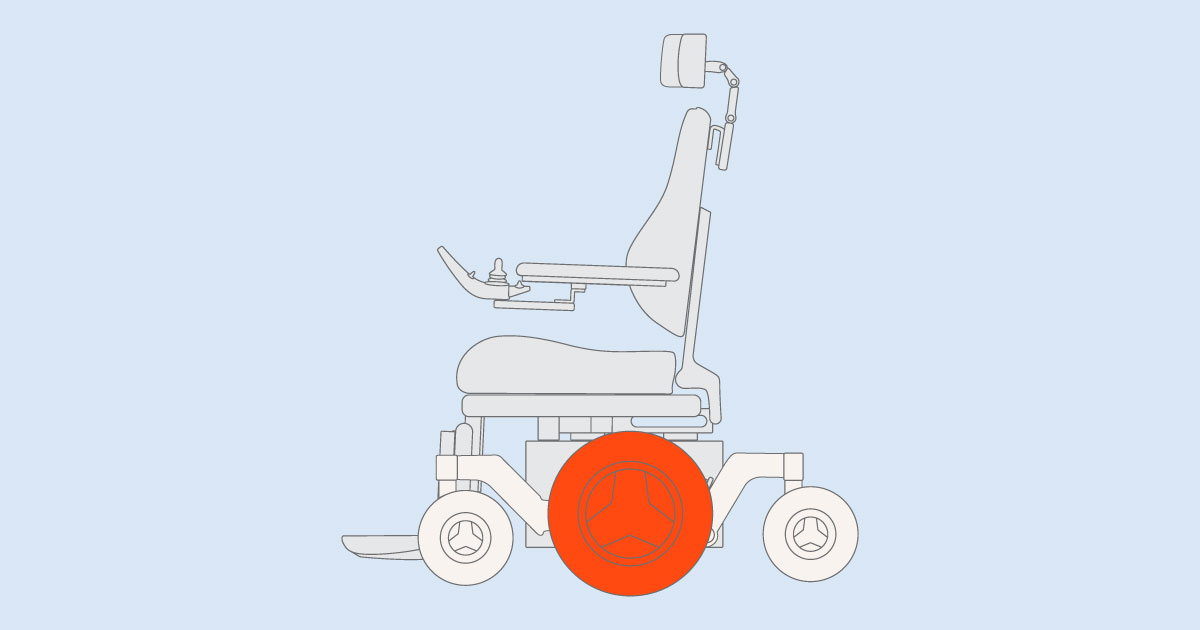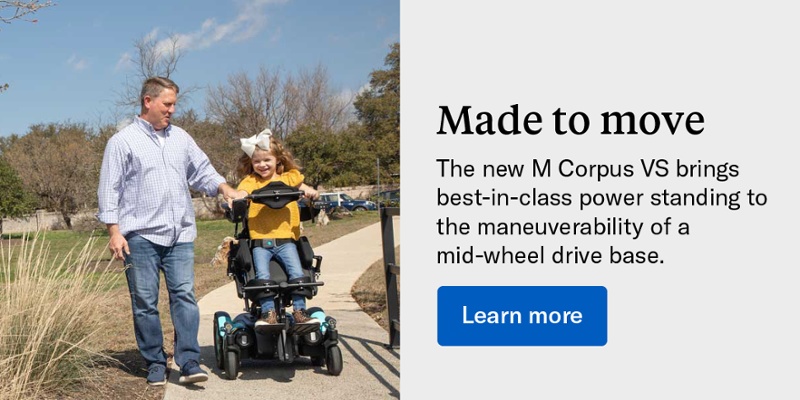In the world of power wheelchair bases, there are three main types of drive wheel configurations to choose from: front-wheel drive (FWD), mid-wheel drive (MWD), and rear-wheel drive (RWD). In our previous blog post, we discussed the factors to consider when determining the best drive wheel configuration for an individual client, as well as the advantages and considerations of a front-wheel drive setup. This time, we're diving into the world of mid-wheel drive and exploring its unique benefits and considerations.
Mid-Wheel Drive

Mid-wheel drive is the most recent technology developed for power wheelchair bases and is the most popular. It combines aspects of FWD and RWD into a hybrid product. MWD provides the smallest overall turning radius but may have some challenges negotiating varied terrains. The closer the drive wheel is to the center of the wheelchair base, the smaller the turning radius, provided the overall base length is the same. Caster size could affect the performance of the chair and a client’s ability to transfer safely.
Benefits of Mid-Wheel Drive
- The smallest turning radius may improve maneuverability in tight spaces.
- MWD driving may feel intuitive and easier to turn in tight spaces as the client is typically sitting directly over the drive wheel (axis of rotation).
- Six wheels on the ground offer superior stability and weight distribution. The front or rear casters ensure stability is maintained whether ascending or descending ramps/inclines.
Considerations of Mid-Wheel Drive
- With six wheels on the ground, there is a chance for the drive wheels to lose traction and not be able to move the base in certain situations (commonly known as high centering). Newer technologies on complex bases provide some compensation for this risk by providing suspension adjustment and additional programming options.
- Six wheels on the ground results in an additional point of energy transfer from the ground to the chair (and ultimately the client). This may potentially limit ride comfort for the client and possibly elicit pain, abnormal tone, or fatigue. However, the suspension system can improve ride comfort.
- Rotating front casters may limit lower extremity positioning options. Revolving front casters could collide with optimally positioned footrests. If this happens, adjustments may be required to compensate for this, such as raising the seat to floor height, or positioning the client more forward on the base (using caution not to impact balance and stability).
- Front caster placement may potentially interfere with stand-pivot transfers by limiting how close the chair can get to the transfer destination or interfering with foot placement during the transfer.
Stay tuned for our next installment in the series on drive wheel configurations, where we will take a closer look at rear-wheel drive and its benefits and considerations.
 Amy Morgan, PT, ATP
Amy Morgan, PT, ATP
Director Product Management ‑ Power Wheelchairs
Amy has been involved in complex rehabilitation technology since beginning her career as a physical therapist in 2000. Amy’s clinical experience primarily includes outpatient and inpatient pediatric care at Cincinnati Children’s Hospital where she worked with a variety of patient populations. Additionally, Amy was the lead therapist in the Wheelchair/Seating Clinic and Comprehensive Neuromuscular Care Center. In 2007, she joined Permobil as the Pediatric and Standing Clinical Specialist/National Clinical Education Manager where she presented lectures both nationally and internationally and provided input to design for new products. Amy has also worked in Sales at Permobil as the Territory Sales Manager for central/southern Ohio where she earned top sales awards multiple years. She is now part of the Marketing organization as the Director of Product Management for Permobil’s power mobility product line.
 Faith Saftler Savage, PT, ATP
Faith Saftler Savage, PT, ATPSeating Specialist and Consultant
The Boston Home
Faith has over 40 years of experience as a physical therapist, seating specialist and rehabilitation technology supplier, treating persons of all ages with a variety of disabilities. She has been working as a seating consultant at The Boston Home for 30 years assisting residents with MS and other chronic disabilities in obtaining appropriate manual and power wheelchair systems to improve posture, comfort, function and independence in mobility. She runs an outpatient clinic at The Boston Home and assists people in the community with diagnoses including SCI, MD, CP and MS to obtain appropriate equipment.
She has published chapters in journals and books including; International Journal of MS Care, Fundamentals in Assistive Technology and Physical Rehabilitation. Speaking topics include seating assessment, power mobility and alternative positioning. Faith received her BS in Physical Therapy from Ithaca College in New York.

